dPHE 3rd Anniversary Workshop: One Health in the era of Global Warming
06 July 2022, 1:00 pm–9:00 pm
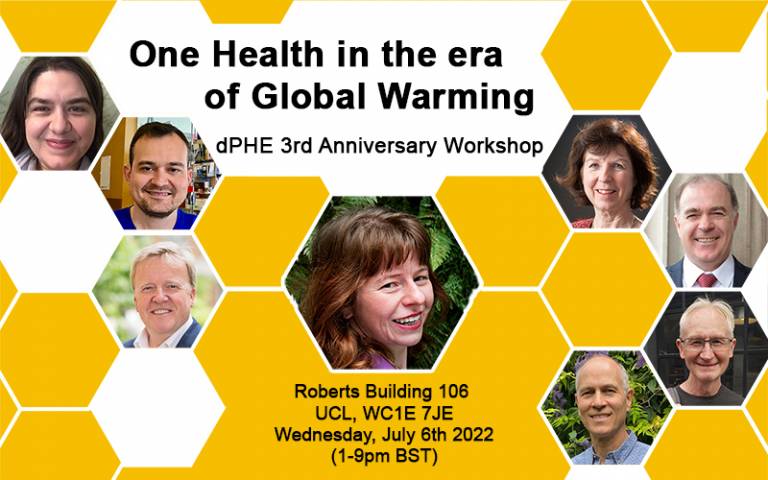
This interdisciplinary workshop will bring together speakers to discuss the challenges and opportunities of Digital One Health!
This event is free.
Event Information
Open to
- All
Availability
- Yes
Cost
- Free
Organiser
-
Professor Patty Kostkova – UCL Institute for Risk and Disaster Reduction
Location
-
Roberts Building 106University College LondonTorrington PlaceLondonWC1E 7JE
As the vast majority of emerging infectious diseases (EID) are zoonotic, it’s very likely the next human epidemics will again come from animals. While the world is still recovering from the devastating COVID-19 pandemic, now is the time to invest in capacity building and preparedness for the next emergency through One Health - digital surveillance using mobile and IoT sensing technology, vector populations modelling and a better understanding of the underlying human behaviour and anthropogenic and social factors enabling animal-human pathogen spillover. Further, the recent climate instability and global warming contributed to the increased potential of vector-borne and zoonotic diseases that, due to the changing habitat, are becoming endemic in new parts of the world. We need to better understand the changing abundance of vector populations across different ecosystems due to evolving weather changes having a profound impact on human health decades down the line.
Building on the dPHE recent successes in the mosquito surveillance initiatives in Brazil and Madeira, this interdisciplinary workshop brings together speakers from the MEWAR project from Brazil, Turkey and Madeira, UCL experts, as well as external international stakeholders to discuss the challenges and opportunities for Digital One Health.
While it seems the COVID-19 pandemic is over, we are not out of the woods yet. New variants are emerging, vaccination programmes are still underway in parts of the world, and the long term impact on citizens health and wellbeing is not fully assessed. The last session will be dedicated to successful COVID-19 digital interventions in the UK and Portugal, and bring unique insights into citizens lifestyle changes throughout the pandemic from our Zoom or not to Zoom study.
Finally, a strategic international workshop with leading experts from UCL and overseas will highlight the major challenges and opportunities for One Health in the context of environmental and societal changes, and risks from global warming.
Confirmed speakers
Welcome
- Prof Patty Kostkova, Centre for Digital Health in Public Emergencies, University College London
- Patty is Professor in Digital Health and the Director of UCL Centre for Digital Public Health in Emergencies (dPHE). She was a consultant at WHO, ECDC, Sky, Telefonica. Her research investigates mobile surveillance in Brazil, maternal health in Nepal and antibiotic stewardship in Nigeria and the NHS. During COVID-19, she lead an award winning project My Lockdown Journal.
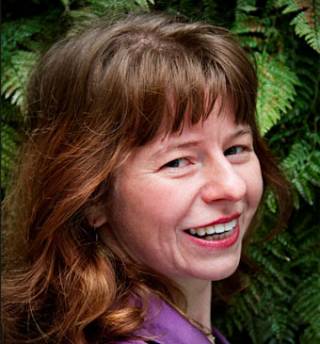
In 2019 and 2020, Patty won the 'Innovator of the Year' Award by Computing Women in IT Excellence Awards and the prestigious Coronaprofile by Business Science, while her team won the Team of the Year 2020 Award by Computing Rising Stars Awards. Patty published over 230 peer-reviewed papers, and is the Editor in chief of Frontiers in Digital Public Health, and General and Scientific Chair of International Public Health Conference since 2009.
Twitter: @pattykostkova
Website: www.ucl.ac.uk/risk-disaster-reduction/people/dr-patty-kostkova
Session 1: Vector-borne disease surveillance and modeling using mobile and IoT technology
- Prof Tiago Massoni, Federal University of Campina Grande
- Currently an associate professor at UFCG, Campina Grande, Brazil. He holds a Ph.D. in software engineering from the Federal University of Pernambuco. His research interests include social aspects of software engineering, software evolution and formal methods.
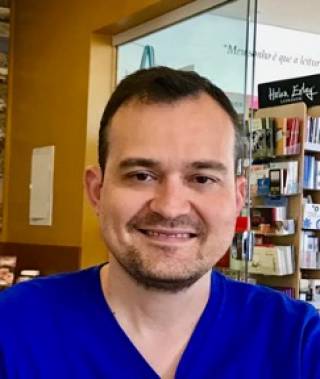
Website: massoni.computacao.ufcg.edu.br
Twitter: @tiagomasson - Prof Wellington Pinheiro dos Santos, Universidade Federal de Pernambuco
- Wellington Pinheiro dos Santos holds a PhD in Electrical Engineering from the Federal University of Campina Grande (2009), Brazil. He is currently Associate Professor at the Department of Biomedical Engineering at the Center for Technology and Geosciences-Escola de Engenharia de Pernambuco, Federal University of Pernambuco. He has experience in the area of Computer Science, with an emphasis on Graphic Processing (Graphics), working mainly on the following topics: digital image processing, pattern recognition, computer vision, evolutionary computing, numerical optimization methods, computational intelligence, image formation techniques, virtual reality, game design and applications of Computing and Engineering in Medicine and Biology. He is a member of the Brazilian Society of Biomedical Engineering (SBEB), the Brazilian Society of Computational Intelligence (SBIC), and the International Federation of Medical and Biological Engineering (IFMBE).
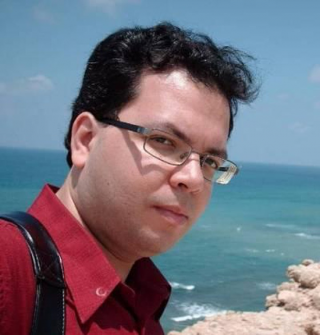
- Aisha Aldosery, Centre for Digital Public Health in Emergencies, University College London
- Aisha Aldosery is a PhD candidate at UCL IRDR Centre for Digital Public Health in Emergencies (dPHE). She moved to London in 2018 and earned her master's degree in Software System Engineering from UCL. Aisha is doing her PhD research on the Internet of Things (IoT) in the context of digital health, specifically vector-borne diseases. Aisha's PhD research project investigates the Internet of Things (IoT) and sensing technologies for predicting mosquito populations to combat vector-borne diseases in Northeast Brazil and Madeira Island – a pertinent global issue with global research significance. Her research aims to combine water, acoustic and environmental sensors for insect sensing and classification – should her IoT sensing system demonstrate the results, we envisage it will be a groundbreaking success.
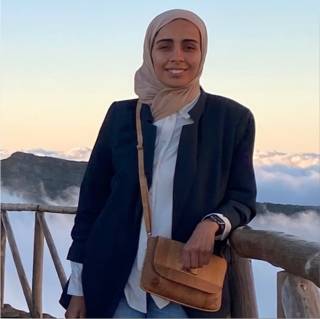
Twitter: @aisha_tec
Website: www.ucl.ac.uk/risk-disaster-reduction/people/phd-students/aisha-aldosery
- Dr Anwar Musah, Department of Geography, University College London
- Anwar Musah is a lecturer at UCL's Department of Geography. Broadly, his research interests focus on the application of statistical modelling, geospatial analysis and data science to public health and social sciences (with a regional focus on the Global South). His interdisciplinary background to date has led him to apply these primarily to areas of infectious disease epidemiology (e.g. cholera, COVID-19, soil-transmitted helminths & schistosomiasis) and medical entomology (e.g. surveillance of arboviruses in Brazil). He has a growing interest in areas of fire hazards & safety and quantitative criminology from an African perspective.
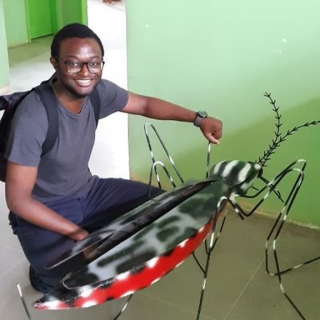
- Dinarte Vasconcelos, ITI, LARSYS, Instituto Superior Técnico
- Details to follow.
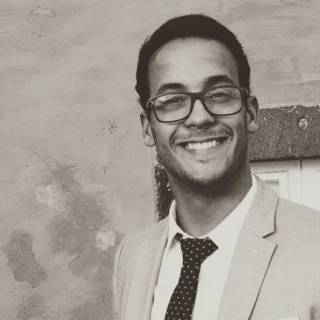
- Dr Giselle Moreno, INterdisciplinary CLimate INvestigation cEnter (INCLINE) at University of São Paulo, Brazil
- Giselle Moreno is one of the researchers on the MEWAR Project, she is linked to the team as a postdoctoral researcher at the INterdisciplinary CLimate INvestigation cEnter (INCLINE) at University of São Paulo, Brazil. She has a master's degree in Neuropsychiatry and Behavioral Sciences and PhD in Biochemistry and Physiology (Federal University of Pernambuco). Her research interests include public health, digital epidemiology, neuroscience and artificial intelligence applied to medicine and biology.
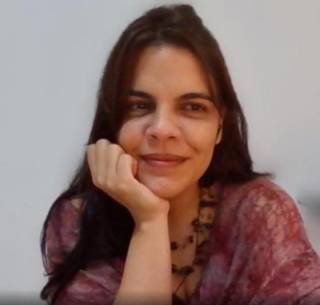
- Session chair: Dr Mohammad Shamsudduha, University College London
- Mohammad Shamsudduha is Associate Professor in Humanitarian Science in the IRDR. He is a geoscientist by academic background. His research is centred around earth’s water resources, environment, and people. He studies and trains students on hydro-meteorological hazards, water risks and resilience to global change using geospatial big data, earth observation satellites, remote sensing, geographic information system and machine learning tools. For over a decade, he worked in South Asia and Sub-Saharan Africa on the promotion of sustainable and equitable access to freshwater, and how water can help nations build resilience to changes in land-use and climate. His current research seeks to bridge the humanitarian-development divide as he argues that protracted humanitarian crises and increasing human displacement, particularly in the Global South, cannot be solved with short-term humanitarian interventions but with sustained development solutions, addressing root causes and social change. Shams works with academic researchers, practitioners, donors, national and international agencies, non-government organisations, and private sector.
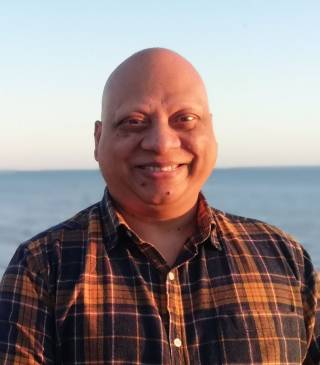
- Prof Patty Kostkova, Centre for Digital Health in Public Emergencies, University College London
- Patty is Professor in Digital Health and the Director of UCL Centre for Digital Public Health in Emergencies (dPHE). She was a consultant at WHO, ECDC, Sky, Telefonica. Her research investigates mobile surveillance in Brazil, maternal health in Nepal and antibiotic stewardship in Nigeria and the NHS. During COVID-19, she lead an award winning project My Lockdown Journal.

In 2019 and 2020, Patty won the 'Innovator of the Year' Award by Computing Women in IT Excellence Awards and the prestigious Coronaprofile by Business Science, while her team won the Team of the Year 2020 Award by Computing Rising Stars Awards. Patty published over 230 peer-reviewed papers, and is the Editor in chief of Frontiers in Digital Public Health, and General and Scientific Chair of International Public Health Conference since 2009.
Twitter: @pattykostkova
Website: www.ucl.ac.uk/risk-disaster-reduction/people/dr-patty-kostkova - Dr Adrian Brown, Centre of Obesity Research, University College London
- Dr Adrian Brown is a Senior Research Fellow & Lecturer In Nutrition and Dietetic at UCL and Senior Specialist Weight Management Dietitian with >16 years of clinical experience. He is Vice Chair of Obesity Specialist group for BDA, on the strategic council for the APPG on Obesity and honorary Academic at OHID (previously Public Health England). His research interests centre around obesity, type 2 diabetes, bariatric surgery, weight stigma and the low energy diets in different patient populations and he led on three UK national surveys looking at the impact of COVID-19 on people living with obesity and clinical services.
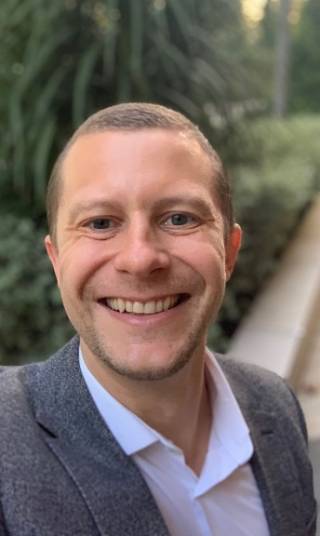
- Aisha Aldosery, Centre for Digital Public Health in Emergencies, University College London
- Aisha Aldosery is a PhD candidate at UCL IRDR Centre for Digital Public Health in Emergencies (dPHE). She moved to London in 2018 and earned her master's degree in Software System Engineering from UCL. Aisha is doing her PhD research on the Internet of Things (IoT) in the context of digital health, specifically vector-borne diseases. Aisha's PhD research project investigates the Internet of Things (IoT) and sensing technologies for predicting mosquito populations to combat vector-borne diseases in Northeast Brazil and Madeira Island - a pertinent global issue with global research significance. Her research aims to combine water, acoustic and environmental sensors for insect sensing and classification – should her IoT sensing system demonstrate the results, we envisage it will be a groundbreaking success.

Twitter: @aisha_tec
Website: www.ucl.ac.uk/risk-disaster-reduction/people/phd-students/aisha-aldosery - Ava Sullivan, EcoHealth Alliance & University College London
- Ava Sullivan is a research scientist and PhD student with dual affiliations at University College London, Institute of Risk and Disaster Reduction, department of Digital Public Health in Emergencies, and EcoHealth Alliance, an NGO based in New York City. Ava has her Master’s degree in Environmental Health and Disaster Management from Tulane University School of Public Health and Tropical Medicine. Ava is interested in the complex pathways driving viral spillover, and in particular, exposure to animal hosts driven by human behavior. Ava is interested in using qualitative methods to characterize these complex human behaviors and assess risk to prevent future pandemics.
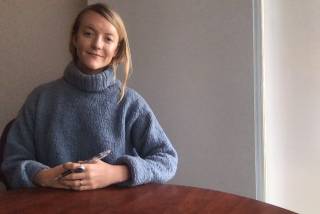
- Lan Li, Centre for Digital Public Health in Emergencies, University College London
- Lan is a PhD student at dPHE, IRDR. Her research topic is integrating behavioural theory into digital intervention to increase vaccine confidence. She is interested in social media data analysis, digital health, behaviour change and vaccination hesitancy studies.

Twitter: @LAN67676474 - Miguel Ribeiro, Técnico, University of Lisbon
- Miguel Ribeiro, is a Ph.D. student in Engineering and Computer Science at Técnico, University of Lisbon. In his PhD, he is investigating how to strategically deploy and implement (community-based) IoT infrastructure to collect big data related to mobility flow, and environmental conditions mainly based on passive Wi-Fi. Before, he worked as a research assistant for more than two years at M-ITI/ARDITI. He got a Master Degree in Informatics Engineering at the University of Madeira also in the area of soft and hard sensing via passive Wi-Fi analytics.
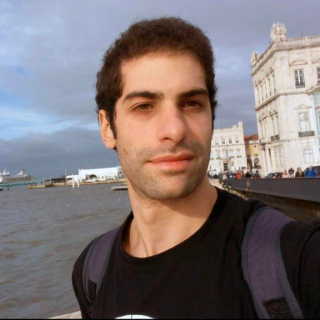
- Prof Pedro F. Campos, Computer Engineering Department, University of Madeira
- Pedro F. Campos is Associate Professor with Habilitation at the Department of Informatics and Interactive Media Design, Univ. of Madeira. He is also Deputy President for Scientific Affairs of ITI/LARSyS (Interactive Technologies Institute), and National Representative for IFIP’s Technical Committee on Human-Computer Interaction. Pedro has more than 120 peer-reviewed papers published in HCI venues and journals.
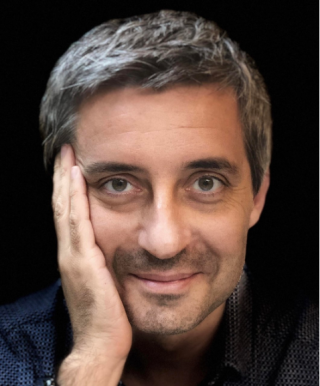
- Prof Bob Spence, Department of Electrical and Electronic Engineering, Imperial College London
- Bob Spence is currently Emeritus Professor of information Engineering at Imperial College London as well as a Teaching Fellow. He is principally known for his pioneering work in human-computer interaction, and especially his design of interfaces. These include the first computer-aided system (MINNIE) for the interactive graphic design of electronic circuits, placed on the international market in 1985 by a company he formed and, more recently (2021), the interface for a smartphone that allows someone with Type-1 diabetes to self-manage their condition. Last month he self-published “Engineering can be fun: an academic’s engagement with the information age”, looking back over more than 6 decades of his engineering experience.
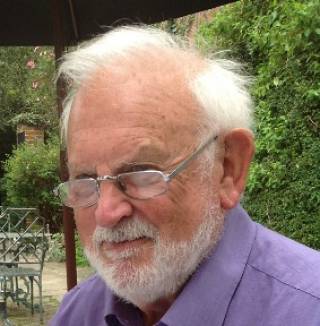
- Dr Lisa Danquah,I nstitute for Risk and Disaster Reduction, University College London
- Lisa is a Lecturer in Global Health at the UCL Institute for Risk and Disaster Reduction. She is interested in the use of digital technologies for contact tracing with a focus on Emerging Infectious Diseases in Low- and Middle-Income Countries, particularly in countries in sub-Saharan Africa. She is particularly interested in viral haemorrhagic fevers, including Ebola virus disease, Marburg virus disease and Lassa fever. She works closely with the Centre for Digital Public Health in Emergencies and contributes to the work through a shared interest and research on improving the use of digital technologies to improve global health, preparedness and response to worldwide emergencies, with her focus being on humanitarian emergencies of emerging infectious outbreaks.
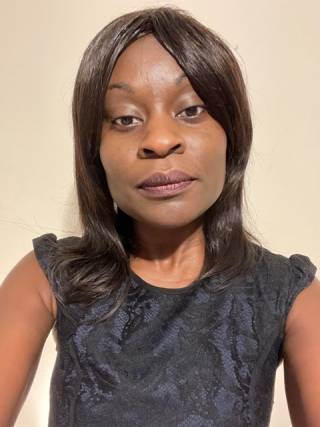
- Session Chair: Dr Zeynep Engin, Computer Science, University College London
- Dr Zeynep Engin has recently joined the Alan Turing Institute taking two roles as the Open Infrastructure Strategy Lead & AI for Science and Government Theme Lead for Tools, Practices & Systems. Prior to this, she has been a Senior Research Associate at UCL Computer Science, introducing and leading UCL’s interdisciplinary and cross-sector research agendas around Algorithmic Governance, Digital Ethics and GovTech. Zeynep is also the Founding Director of Data for Policy CIC, a global community of interest that runs the top conference in this space; and the (founding) Editor-in-Chief for the first open-access journal in this field, Data & Policy, published by Cambridge University Press. She has over ten years of executive experience in the non-profit sector and obtained her PhD in Bioengineering and Computational Neuroscience from Imperial College London.
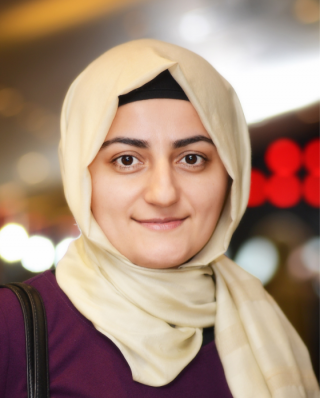
- Ava Sullivan, EcoHealth Alliance & University College London
- Ava Sullivan is a research scientist and PhD student with dual affiliations at University College London, Institute of Risk and Disaster Reduction, department of Digital Public Health in Emergencies, and EcoHealth Alliance, an NGO based in New York City. Ava has her Master’s degree in Environmental Health and Disaster Management from Tulane University School of Public Health and Tropical Medicine. Ava is interested in the complex pathways driving viral spillover, and in particular, exposure to animal hosts driven by human behavior. Ava is interested in using qualitative methods to characterize these complex human behaviors and assess risk to prevent future pandemics.

- Iuri Valério Graciano Borges, University of São Paulo - Institute of Astronomy, Geophysics and Atmospheric Sciences (USP/IAG)
- Master student in the Post-Graduate Program in Meteorology at IAG/USP, participates in MEWAR working with cases of dengue and precipitation in the city of Recife/Brazil. Bachelor in Meteorology from UNESP. During graduation, he was supported for a Scientific Initiation project by the Scientific Development Council of Brazil, working with a precipitation field from rainfall measurements and precipitation estimates from weather radar, as well as conducted a research on the effect of tropospheric ozone in the cerrado from the region of Bauru/Brazil, the latter being the subject of his Final paper.
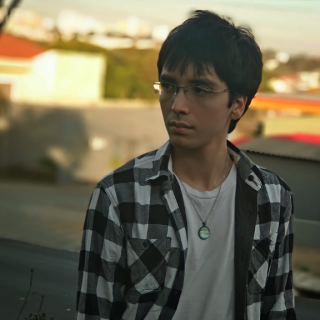
- Dr Luiza Campo, Department of Civil, Environmental, and Geomatic Engineering, University College London
- Luiza Campos is a civil engineer specializing in water and sanitation with over 30 years of experience, including academia and industry. She is currently an Associate Professor of Environmental Engineering at the Department of Civil, Environmental and Geomatic Engineering of UCL and Co-Director of the UCL Centre for Urban Sustainability and Resilience. Her research focuses on design and evaluation of cost-effective water/sanitation technologies and interventions to reduce environmental pollution and improve public health and wellbeing. Her research is divided in three main areas: (1) advancing developments in water treatment technologies; (2) exploring interlinkages in the water nexus; and (3) promoting improvements in sanitation, hygiene and health.
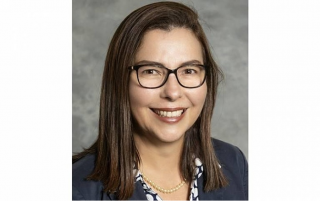
- Clarisse Lins de Lima, Polytechnique School of the University of Pernambuco (Poli-UPE)
- Clarisse received her bachelor's and master's degrees in Biomedical Engineering from the Federal University of Pernambuco. She is currently a Ph.D. student in Computer Engineering at the Polytechnic School of the University of Pernambuco (Poli-UPE), and her research focuses on the spatiotemporal forecast of diseases transmitted by the Aedes aegypti mosquito in the city of Recife-PE. Her areas of interest are computational intelligence, digital epidemiology, biomedical computing, and artificial intelligence applied to medicine and biology
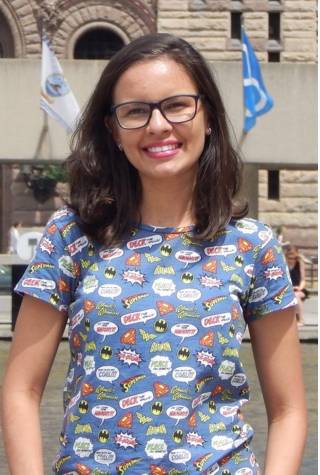
Session 4: Strategic Panel: One Health in the era of Global Warming
- Prof Geraint Rees, Vice Provost (Research, Innovation and Global Engagement), University College London
- Prof Geraint Rees is Vice Provost (Research, Innovation and Global Engagement), responsible for providing vision and academic leadership for UCL’s world-leading research, knowledge exchange and global engagement across an outstanding comprehensive university, maximising UCL’s collective impact on the world. He is a non-executive Director of UCL Business, one of the UK’s most successful technology transfer companies, and was a Senior Scientific Advisor at DeepMind from 2018-2020. Previously he served as Pro-Provost (Academic Planning) from 2021-22, and was Dean of the UCL Faculty of Life Sciences from 2014 to 2022. With a professional background as a neurologist and neuroscientist, his research seeks to understand the neural basis of human cognition and uses machine learning to develop novel solutions to global healthcare challenges. He has published over 300 research papers, and was elected a Fellow of the Academy of Medical Sciences in 2010.
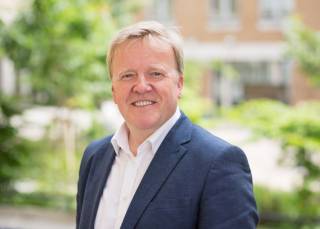
- Professor Andrew Hayward, Institute of Epidemiology and Health Care, University College London
- Andrew Hayward is UCL Professor of Infectious Disease Epidemiology and Inclusion Health and Director of the UCL Institute of Epidemiology and Health Care. He is chief investigator of the Flu Watch and Virus Watch studies. These large scale community cohorts investigate transmission , social risk factors and immunity to seasonal and pandemic infections. Andrew is a member of the New and Emerging Respiratory Virus Threats Advisory Group (NERVTAG) and the SAGE transmission subgroup.
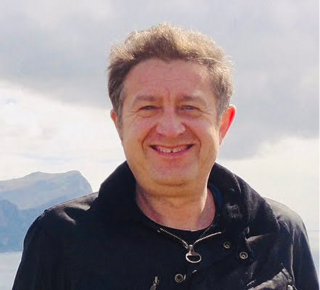
- Prof Patty Kostkova, Centre for Digital Health in Public Emergencies, University College London
- Patty is Professor in Digital Health and the Director of UCL Centre for Digital Public Health in Emergencies (dPHE). She was a consultant at WHO, ECDC, Sky, Telefonica. Her research investigates mobile surveillance in Brazil, maternal health in Nepal and antibiotic stewardship in Nigeria and the NHS. During COVID-19, she lead an award winning project My Lockdown Journal.

In 2019 and 2020, Patty won the 'Innovator of the Year' Award by Computing Women in IT Excellence Awards and the prestigious Coronaprofile by Business Science, while her team won the Team of the Year 2020 Award by Computing Rising Stars Awards. Patty published over 230 peer-reviewed papers, and is the Editor in chief of Frontiers in Digital Public Health, and General and Scientific Chair of International Public Health Conference since 2009.
Twitter: @pattykostkova
Website: www.ucl.ac.uk/risk-disaster-reduction/people/dr-patty-kostkova - Prof Kate Jones, Centre for Biodiversity and Environment Research, University College London
- Kate Jones is Professor of Ecology and Biodiversity in the Dept. of Genetics, Evolution & Environment, UCL and Director of the People and Nature Lab. She is a world-leading ecologist whose work focuses on crossing disciplinary boundaries to address critical global challenges, especially at the interface of ecological and human health. She has made key advances in monitoring the health of ecosystems and particularly in modeling and forecasting zoonotic disease outbreaks in humans, breaking down traditional barriers between ecology, climate change and public health to inform global policy.
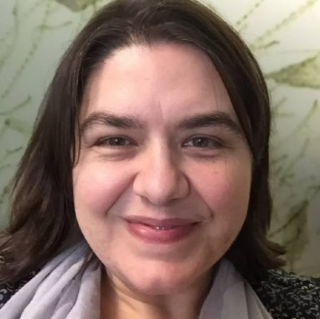
- Prof Julio D. Dávila, Development Planning Unit, University College London
- Julio D. Dávila is Professor of Urban Policy and International Development, and former Director, The Bartlett Development Planning Unit, UCL. A civil engineer and urban development planner with international experience in research and consultancy projects in 15 countries in Latin America, the Middle East, Africa and Asia. Research on local government in progressive social and political transformation; governance of urban and peri-urban infrastructure, (transport, and WATSAN); rapid urbanisation and health. Fellow, Institution of Civil Engineers (UK).
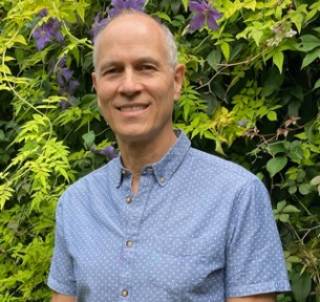
- Prof Tiago Massoni, Federal University of Campina Grande
- Currently an associate professor at UFCG, Campina Grande, Brazil. He holds a Ph.D. in software engineering from the Federal University of Pernambuco. His research interests include social aspects of software engineering, software evolution and formal methods.
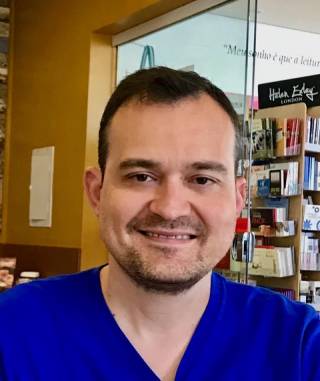
Website: massoni.computacao.ufcg.edu.br
Twitter: @tiagomassoni - Prof Andrew Cunningham, Institute of Zoology, Zoological Society of London
- Professor Andrew Cunningham, Deputy Director of Science at the Zoological Society of London, investigates disease threats to wildlife conservation, including the drivers of disease emergence and zoonotic spill-over. He was awarded a CSIRO medal for co-discovering Batrachochytrium dendrobatidis as a cause of global amphibian declines, a Royal Society Wolfson Research Merit Award for his work on zoonotic viruses in African bats and, in 2016, he was appointed a Fellow of the Royal College of Veterinary Surgeons for meritorious contributions to learning. Since its inception in 2021, he has been a member of the WHO/OIE/FAO/UNEP One Health High Level Expert Panel.
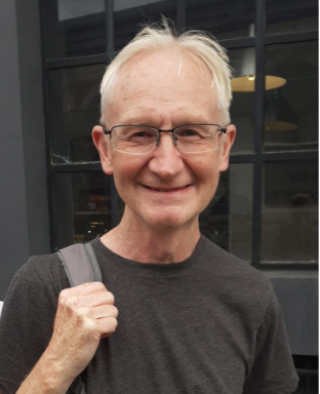
Programme
Time | Speaker | Affiliation | Talk title |
1:00 PM | Registration | ||
Welcome | |||
1:30 | Prof Patty Kostkova | Centre for Digital Public Health in Emergencies, University College London, UK | Welcome & Introduction: Digital One Health and Digital Interventions - MEWAR, COVID19 and 3 years of dPHE |
Session 1: Vector-borne disease surveillance and modeling using mobile and IoT technology | |||
Session chair: Tercio Ambrizzi, University of Sao Paulo | |||
1:45 | Tiago Massoni & Giselle Moreno | Federal University of Campina Grande, Brazil & University of São Paulo, Brazil | Mosquito surveillance in northeast Brazil - how it works and lessons learned |
2:00 | Wellington Pinherio dos Santos & | Universidade Federal de Pernambuco, Brazil & Polytechnique School of the University of Pernambuco | Spatiotemporal forecasting for dengue, chikungunya fever and zika using machine learning and artificial expert committees based on meta-heuristics |
2:15 | Aisha Aldosery | Centre for Digital Public Health in Emergencies, University College London, UCL, UK | Smart Mosquito Ovitraps and Mobile Surveillance |
2:30 | Anwar Musah | Department of Geography, University College London, UK | Use of spatiotemporal models for predicting the burden of mosquito infestation in Brazilian cities |
2:45 | Dinarte Vasconcelos | ITI, LARSYS, Instituto Superior Técnico, Lisbon, Portugal | Acoustic Sensors for Monitoring Ecosystem |
3:00 | Coffee break | ||
Session 2: Digital Interventions - COVID-19 and beyond | |||
Session chair: : Dr Mohammad Shamsudduha, IRDR UCL | |||
3:30 | Patty Kostkova, Aisha Aldoseery and Adrian Brown | Centre for Digital Public Health in Emergencies, University College London, UK Centre of Obesity Research, University College London, UK | My Activity Journal App project - supporting citizens during lockdown |
3:45 | Lan Li and Ava Sullivan | Centre for Digital Public Health in Emergencies, University College London, UK & EcoHealth Alliance, USA | Zoom or not to Zoom |
4:00 | Miguel Ribeiro | Técnico, University of Lisbon, Portugal | Madeira Safe App |
4:15 | Bob Spence | Department of Electrical and Electronic Engineering, Imperial College London, UK | The Impact of Images |
4:30 | Lisa Danquah | Centre for Digital Public Health in Emergencies, University College London, UK | Improving Contact Tracing in Sierra Leone: |
Session 3: Environmental and Cultural Factors in One Health Surveillance | |||
Session chair Dr Zeynep Engin, Computer Science, University College London | |||
4:45 | Ava Sullivan | Centre for Digital Public Health in Emergencies, University College London, UK & EcoHealth Alliance, USA | Anthropogenic Activities Influencing Spillover Risk |
5:00 | Iuri Valério Graciano Borges
| University of São Paulo - Institute of Astronomy, Geophysics and Atmospheric Sciences (USP/IAG), Brazil | Dengue in Recife: Analysis of the interrelationship between precipitation and confirmed cases from a climatic, geographic and public health perspective |
5:15 | Luiza Campos, and Clarisse Lins de Lima | Department of Civil, Environmental and Geomatic Engineering, University College London, UK Polytechnique School of the University of Pernambuco (Poli-UPE), Brazil | Water and sanitation conditions in the MEWAR's case study areas |
5:30 | Coffee break | ||
Session 4: Strategic Panel: One Health in the era of Global Warming | |||
Session chair: Prof Andrew Heyward, Institute of Epidemiology and Health Care, University College London | |||
6:00 | Prof Geraint Rees | Vice Provost (Research, Innovation and Global Engagement), University College London, UK | Welcome Remark |
6:00 | Prof Andrew Heyward | Institute of Epidemiology and Health Care, University College London, UK | Introductions of panelists |
6:10 | Prof Patty Kostkova | Centre for Digital Public Health in Emergencies, University College London. UK | Panel member lightning talks |
Prof Kate Jones | Centre for Biodiversity and Environment Research, University College London, UK | ||
Prof Julio Davilla | Development Planning Unit, University College London, UK | ||
Dr Tiago Massoni | Federal University of Campina Grande, Brazil | ||
Prof Andrew Cunningham | Institute of Zoology, Zoological Society of London, UK | ||
6:30 | Panel discussion | ||
7:25 | Prof Patty Kostkova | Centre for Digital Public Health in Emergencies, University College London, UK | Closing remarks |
7:30 Drinks and canapes reception | |||
9:00 | End | ||
If you are unable to attend in person, watch the livestream of the event on the IRDR YouTube channel.
We look forward to seeing you in July 2022!
 Close
Close

